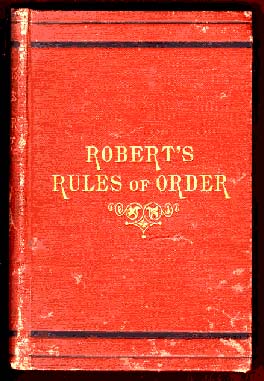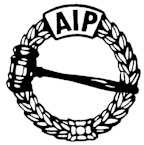
Robert's Rules of Order, often simply referred to as Robert's Rules, is a manual of parliamentary procedure by U.S. Army officer Henry Martyn Robert. "The object of Rules of Order is to assist an assembly to accomplish the work for which it was designed [...] Where there is no law [...] there is the least of real liberty". The term "Robert's Rules of Order" is also used more generically to refer to any of the more recent editions, by various editors and authors, based on any of Robert's original editions, and the term is used more generically in the United States to refer to parliamentary procedure.

Parliamentary procedure is the accepted rules, ethics, and customs governing meetings of an assembly or organization. Its object is to allow orderly deliberation upon questions of interest to the organization and thus to arrive at the sense or the will of the majority of the assembly upon these questions. Self-governing organizations follow parliamentary procedure to debate and reach group decisions, usually by vote, with the least possible friction.
A repeal is the removal or reversal of a law. There are two basic types of repeal; a repeal with a re-enactment is used to replace the law with an updated, amended, or otherwise related law, or a repeal without replacement so as to abolish its provisions altogether.

The American Institute of Parliamentarians (AIP) is a not-for-profit educational organization founded in 1958. The objectives of AIP are to promote the use and teaching of parliamentary procedure, as well as the training and certification of parliamentarians.

A gavel is a small ceremonial mallet commonly made of hardwood, typically fashioned with a handle. It can be used to call for attention or to punctuate rulings and proclamations and is a symbol of the authority and right to act officially in the capacity of a presiding officer. It is often struck against a sound block, a striking surface typically also made of hardwood, to enhance its sounding qualities. According to tradition, Vice President of the United States John Adams used a gavel as a call to order in the first U.S. Senate in New York in 1789. Since then, it has remained customary to tap the gavel against a lectern or desk to indicate the opening and closing of proceedings and, in the United States, to indicate that a judge’s decision is final. It is also used to keep the meeting itself calm and orderly.
A parliamentary authority is a book of rules for conducting business in deliberative assemblies. Several different books have been used by legislative assemblies and by organizations' deliberative bodies.
In parliamentary procedure, reconsideration of a motion may be done on a matter previously decided. The motion to "reconsider" is used for this purpose. This motion originated in the United States and is generally not used in parliaments. A special form of this motion is reconsider and enter on the minutes.
In parliamentary procedure, a motion to appeal from the decision of the chair is used to challenge a ruling of the chair.
In certain countries, a motion in parliamentary procedure is a formal proposal by a member of a deliberative assembly that the assembly take certain action. Such motions, and the form they take are specified by the deliberate assembly and/or a pre-agreed volume detailing parliamentary procedure, such as Robert's Rules of Order; The Standard Code of Parliamentary Procedure; or Lord Citrine's The ABC of Chairmanship. Motions are used in conducting business in almost all legislative bodies worldwide, and are used in meetings of many church vestries, corporate boards, and fraternal organizations.
In the United States, a parliamentarian is an expert on parliamentary procedure who advises organizations and deliberative assemblies. This sense of the term "parliamentarian" is distinct from the usage in parliamentary republics and monarchies as a synonym for member of parliament.
In United States parliamentary procedure, a suspension of the rules allows a deliberative assembly to set aside its normal rules to do something that it could not do otherwise. However, there are rules that cannot be suspended.
In parliamentary procedure in the United States, a motion to postpone to a certain time is used to delay action on a pending question until a different day, meeting, hour or until after a certain event. Then, when that time comes, the consideration of the question is picked up where it was left off when it was postponed.

George Demeter was the author of Demeter's Manual of Parliamentary Law and Procedure. The second Wednesday in April has been designated as George Demeter Day in Massachusetts.
In disciplinary procedures, the motion to declare the chair vacant is used as a remedy to misconduct or dereliction of duty by the chairperson of a deliberative assembly, when the rules allow it. It is usually combined with a motion to elect a new chair.
In parliamentary procedure, requests and inquiries are motions used by members of a deliberative assembly to obtain information or to do or have something done that requires permission of the assembly. Except for a request to be excused from a duty, these requests and inquiries are not debatable nor amendable.
The history of parliamentary procedure refers to the origins and evolution of parliamentary law used by deliberative assemblies.
The motion to impeach is used to bring an accusation against a person. A majority vote is needed to put the accused on trial. A majority vote convicts for a minor offense, and a two-thirds vote for a major offense. A vote of censure or reprimand requires majority vote, and suspension or expulsion a two-thirds vote.
Parliamentary procedure is the body of rules, ethics, and customs governing meetings and other operations of clubs, organizations, legislative bodies, and other deliberative assemblies. General principles of parliamentary procedure include rule of the majority with respect for the minority.
In parliamentary procedure, the verb to table has the opposite meaning in the United States from that of the rest of the world:





